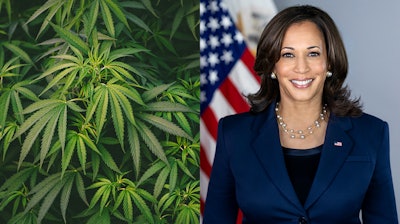
Democratic presidential nominee Kamala Harris said she will “fight” for federal cannabis legalization should her 2024 campaign conclude with a victory this November.
Harris and vice-presidential running mate Tim Walz, the current governor of Minnesota, laid out their “Opportunity Agenda for Black Men” on Oct. 14, a five-part plan that includes federal cannabis legalization to help deliver opportunities for “Black men and their families.”
If elected on Nov. 5, the Harris-Walz ticket is now vowing to legalize cannabis to “break down unjust legal barriers that hold Black men and other Americans back” and to create opportunities for Black Americans to succeed in a new federal cannabis industry.
To break down those barriers, Harris intends to work with “Congress to ensure that the safe cultivation, distribution and possession of recreational marijuana is the law of the land,” according to her new opportunity agenda. “She will also fight to ensure that as the national cannabis industry takes shape, Black men—who have, for years, been overpoliced for marijuana use—are able to access wealth and jobs in this new market.”
According to the American Civil Liberties Union (ACLU), a Black person is 3.6 times more likely than white people to be arrested for marijuana possession despite comparable marijuana usage rates. The racial disparities were highest in Montana (9.6 times more likely) and Kentucky (9.4 times more likely) as of 2018, according to the ACLU.
In addition, while Black people make up 14% of the U.S. population, they represented 2% of America’s estimated 30,000 cannabis business owners in 2021, according to an equity report by industry education provider Leafly.
“As I have traveled across the country, I have spoken with many Americans—including Black men—about their hopes, dreams, hurdles, and worries,” Harris said Monday on social media. “Black men and boys deserve a president who sees them and will help break through the barriers preventing them from building intergenerational wealth and realizing their aspirations.
“When we invest in Black men—their dreams, aspirations, and ambitions—we are stronger.”
This isn’t the first time Harris has indicated her support for federal cannabis legalization while serving as the vice president to Joe Biden, whose administration is currently working on potentially finalizing a rule to reschedule cannabis as a Schedule III drug under the Controlled Substances Act.
RELATED: Cannabis Rescheduling No Longer on Fast Track; Hearing Scheduled For December
However, rescheduling cannabis would not decriminalize cannabis.
During a White House roundtable discussion on criminal justice and cannabis drug policy in March 2024, Harris said, “We need to legalize marijuana,” that “nobody should have to go to jail for smoking weed,” and that “what we need to do is recognize that far too many people have been sent to jail for simple marijuana possession.”
Those statements came before Biden dropped out of the 2024 race in July. Since Harris officially became the Democratic presidential nominee in early August, her stance on federal cannabis legalization hasn’t taken center stage until now.
In addition, Harris’ new campaign agenda to federally legalize cannabis comes more than a month since Republican presidential candidate Donald Trump said on Truth Social, “As president, we will continue to focus on research to unlock the medical uses of marijuana to a Schedule 3 drug, and work with Congress to pass common sense laws.”
The vocal support for cannabis reform from both the Democratic and Republican presidential nominees comes at a time when an all-time high of 70% of Americans support legalizing cannabis in the U.S. according to Gallup.
John Mueller, the CEO of Missouri-based multistate cannabis operator Greenlight, pointed to the historical significance in a statement provided to Cannabis Business Times.
“This is the first time in history that both candidates have indicated that they will advance cannabis legalization,” Mueller said. “This commitment could be the final blow to a failed 50-year policy that has unjustly impacted countless lives. What we are building here in the Midwest is an example of how other states can implement a program that is both responsive to consumers and patients as well as one that adds revenue and jobs to the state. Cannabis has the potential to be a thriving economic and agricultural engine for many states.”
Gibran Washington, the CEO of Pennsylvania-based multistate operator Ethos Cannabis, said in a statement provided to CBT that Harris’ plan for cannabis legalization is a “landmark shift” that will catalyze both industry growth and scientific advancement.
“This stance will unlock unprecedented opportunities for rigorous research into cannabis’ vast therapeutic potential as well as help the current legal industry thrive,” Washington said. “Legalization will not only foster innovation but also dismantle barriers to patient access, allowing us to revolutionize health care with evidence-based cannabis therapies.”
Despite Trump’s 2024 campaign comments, the Harris team indicated in Monday’s “Opportunity Agenda for Black Men” that Trump’s Department of Justice during his first term as president from 2017 to 2020 threatened state-legal cannabis operations with federal prosecutions, “continuing the unjust and disproportionate use of marijuana possession laws to put Black Americans behind bars.”
Specifically, Trump’s first Attorney General Jeff Sessions rescinded an Obama-era policy—commonly referred to as the Cole Memo—that directed the federal government to not intervene with state-legal cannabis operations. Trump’s administration also tightened lending rules to prohibit banks from using Small Business Administration-backed loans to finance any business that had direct interaction with the cannabis industry.
However, Trump said on his social platform last month that, if elected for a second term, he’d work to provide safe banking for state-authorized cannabis companies and that he supports states’ rights to pass cannabis laws, like in his home state of Florida.

























